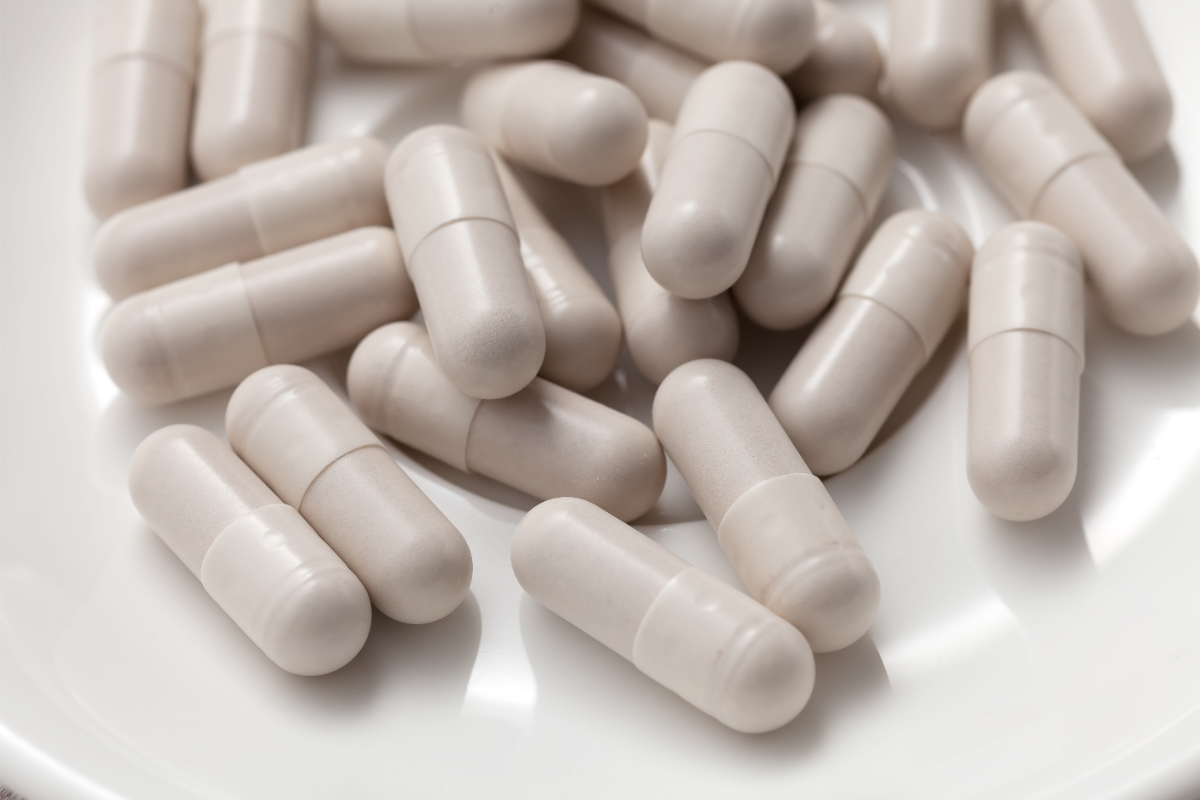In the vast field of health and well-being, understanding antioxidant mechanisms and free radicals is essential. The latter, discovered during the 20th century, are atoms or molecules characterised by an unpaired electron, making them extremely reactive. Although naturally present in our bodies as by-products of essential metabolic processes, free radicals can, in excess, cause oxidative stress that is harmful to our cells and tissues, leading to premature ageing and various chronic diseases.
In the face of these challenges, antioxidants such as Glutathione and the association GlyNac (Glycine Nac) play a key role. Glutathione, nicknamed the‘master antioxidant’, is a molecule produced naturally by our bodies. Its ability to neutralise free radicals and detoxify heavy metals is crucial to maintaining our immunity and overall health. However, with age and external aggression, its production can decrease, making supplementation sometimes necessary.
On the other hand, GlyNac, an innovative combination of Glycine and N-acetylcysteine, has been shown to be an effective precursor of glutathione, boosting the body’s antioxidant defences. This unique synergy offers new perspectives in the fight against oxidative stress and supports the healthy ageing process.
In this article, we take a deep dive into the properties and benefits of these two powerful antioxidants. Based on relevant scientific studies, we’ll guide you in choosing between GlyNac and glutathione for optimal use in the pharmacy. Whether you’re already familiar with these supplements or are just discovering their potential, this detailed analysis aims to provide you with all the information you need to make an informed choice that’s tailored to your health needs.
What is Glutathione?
The concept of free radicals and antioxidants plays a crucial role in cellular protection in the human body. These free radicals, discovered in the 1930s, are unstable atoms or molecules. They are the result of normal oxidative processes within our bodies. They can be beneficial in moderate quantities but become harmful when in excess, leading to oxidative stress.
Free radicals, produced naturally in the mitochondria during the conversion of oxygen to ATP, accumulate with age. This accumulation leads to various cellular dysfunctions. In addition, an excess of these radicals can be caused by a number of environmental factors. These include pollution, radiation, dietary imbalances and psychological stress.
Oxidative damage to cells can lead to serious pathologies such as cancer, diabetes and cardiovascular disease. Glutathione, as a master antioxidant, plays a crucial role in neutralising free radicals and protecting against this damage. It is also essential for detoxifying heavy metals and other toxins.
Glutathione is a tripeptide made up of three amino acids: cysteine, glutamic acid and glycine. This unique structure gives it great stability and remarkable effectiveness. It exists in two main forms in our bodies: the reduced form (GSH), which is active and capable of trapping free radicals, and the oxidised form (GSSG), which is formed after the GSH has neutralised these radicals. The balance between these two forms is essential for maintaining good cellular health.
What are the different roles of Glutathione?
Glutathione is involved in many vital functions. It plays a central role in protecting cells against oxidative damage, by neutralising free radicals and regenerating other antioxidants, such as vitamin C and vitamin E. It also plays an active role in detoxifying toxins and heavy metals, making them water-soluble and facilitating their elimination by the liver and kidneys.
Antioxidant properties
As an antioxidant, glutathione protects cells and tissues from damage caused by oxidative stress. This is particularly crucial in the fight against cell ageing and the prevention of many chronic diseases. Its ability to neutralise free radicals and regulate oxidative stress makes it an essential component of overall health.
Detoxification of heavy metals
Glutathione plays an essential role in the detoxification of heavy metals such as lead, mercury and arsenic. By binding to these toxins, it transforms them into less harmful forms that can be excreted by the body. This function is of vital importance, as the accumulation of heavy metals can lead to serious health problems, including neurological damage and immune system disorders.
What is GlyNac?
GlyNac is a synergistic combination of two components: glycine and N-acetylcysteine (NAC). Glycine is a simple amino acid, present in many proteins in the human body, and plays a role in collagen synthesis. NAC, on the other hand, is a derivative of the amino acid L-cysteine and acts as a precursor of glutathione, promoting its production in the body.
Benefits of GlyNac supplementation
Taking glycine and NAC at the same time offers a number of health benefits. This synergy increases glutathione production, thereby improving the body’s antioxidant defences. This translates into better protection against cellular damage and a potential reduction in various health risks linked to oxidative stress.
Effect on oxidative stress
Oxidative stress is an imbalance between free radicals and antioxidants in the body. This imbalance can cause cell damage. Supplementation with glycine and NAC plays an important role. It increases glutathione levels and helps to rebalance this system. In this way, it reduces the harmful effects of free radicals and promotes cell health.
Impact on the ageing process
Ageing is a complex process influenced by many factors, including oxidative stress. By improving the body’s antioxidant capacity, glycine and NAC can help slow down certain aspects of cellular ageing. This preventive approach can play a role in long-term health, in particular by supporting healthy organ function and preserving skin vitality.
What is the difference between Glutathione and GlyNac?
A study compared the effects of glutathione and GlyNac. This research showed that GlyNac supplementation in older adults was safe and well tolerated. In addition, it revealed significant improvements in the management of oxidative stress and mitochondrial dysfunction. These improvements also concerned other age-related signs. At the same time, another study on glutathione indicated that taking it orally could positively increase glutathione reserves in the body. This increase potentially plays a role in reducing systemic oxidative stress in humans.
Is glutathione effective in reducing oxidative stress?
According to the results of these studies, GlyNac supplementation and glutathione are both highly effective in combating oxidative stress. The study on GlyNac highlights its significant benefits in improving glutathione deficiency and reducing oxidative stress, among other age-related benefits. As for glutathione, it has been observed that it may help to reduce markers of oxidative stress in humans, indicating its potential as an effective antioxidant.
Absorption and bioavailability
Another comparative study evaluated the effects of N-acetylcysteine (NAC), oral glutathione and a sublingual form of GSH on markers of oxidative stress. This research provides important information on their absorption and efficacy, highlighting that the way in which these supplements are administered can influence their bioavailability and, consequently, their efficacy.
Finally, one study showed that NAC supplementation improves exercise performance and reduces oxidative stress, but only in individuals with low baseline glutathione levels. This suggests that the effectiveness of these supplements may vary according to individual characteristics, underlining the importance of a personalised approach to nutrition. This research provides a solid scientific basis for the use of these supplements in various health contexts.
What are the different forms of Glutathione available in pharmacies?
Liposomal Glutathione
Liposomal glutathione is an advanced form of supplementation. In this formulation, the glutathione is encapsulated in liposomes, which are small spheres made up of lipid layers. This structure provides better protection for the glutathione against digestive degradation and promotes more efficient absorption in the intestine. Thanks to this technology, liposomal glutathione is often considered to be more bioavailable than traditional forms.
Glutathione-based supplements
Conventional glutathione supplements generally come in tablet, capsule or powder form. Regular forms of glutathione are more accessible and often less expensive. However, compared with the liposomal form, they may be less effective in terms of absorption and bioavailability. In addition, the breakdown of glutathione in the digestive system plays a role. This can significantly reduce the amount of glutathione that actually reaches the bloodstream and the cells.
How should glutathione be taken?
The optimal dosage of glutathione may vary according to several factors, such as age, weight, general state of health and the specific objectives of the supplementation. Generally speaking, doses vary from 100 to 500 mg per day for dietary supplements. Because liposomal glutathione is better absorbed, doses may be slightly lower. It is advisable to consult a health professional before starting glutathione supplementation. This is particularly important if you have specific medical conditions. In addition, potential interactions with other medications you may be taking should be taken into account.
What are the side effects of Glutathione?
The scientific literature does not frequently report side effects of glutathione supplementation in humans. This observation suggests that this antioxidant is generally well tolerated when taken orally. Nevertheless, it is crucial to bear in mind that individual reactions to supplements may vary. In addition, some studies may not cover all possible cases.
One study looked at the impact of liposomal glutathione supplementation. The study looked at blood glutathione levels and other indicators of immune function. The results showed a significant increase in blood glutathione levels. In addition, no major side effects were observed in any of the participants. This suggests that liposomal glutathione is well tolerated in a controlled supplementation setting.
One study explored the impact of glutathione supplementation on insulin sensitivity. This research included obese subjects, some with type 2 diabetes. The study focused mainly on the efficacy of glutathione on insulin sensitivity and oxidative stress. It also reported no significant side-effects linked to glutathione consumption.
It is essential to consult a health professional before starting a supplementation regime. Side effects may vary according to individual health conditions. In addition, existing medications and other factors likely to influence the response to supplementation must be taken into account.
References:
- J Gerontol A Biol Sci Med Sci . 2023 Jan 26;78(1):75-89. doi: 10.1093/gerona/glac135.
Supplementing Glycine and N-Acetylcysteine (GlyNAC) in Older Adults Improves Glutathione Deficiency, Oxidative Stress, Mitochondrial Dysfunction, Inflammation, Physical Function, and Aging Hallmarks: A Randomized Clinical Trial - Eur J Nutr . 2015 Mar;54(2):251-63. doi: 10.1007/s00394-014-0706-z. Epub 2014 May 5.
Randomized controlled trial of oral glutathione supplementation on body stores of glutathione - 2018 Feb 1:115:288-297. doi: 10.1016/j.freeradbiomed.2017.12.007. Epub 2017 Dec 9. N-acetylcysteine supplementation increases exercise performance and reduces oxidative stress only in individuals with low levels of glutathione
- Redox Biol. 2015 Dec:6:198-205. doi: 10.1016/j.redox.2015.07.012. Epub 2015 Jul 29.
Effects of N-acetylcysteine, oral glutathione (GSH) and a novel sublingual form of GSH on oxidative stress markers: A comparative crossover study - 2018 Jan;72(1):105-111. doi: 10.1038/ejcn.2017.132. Epub 2017 Aug 30. Oral supplementation with liposomal glutathione elevates body stores of glutathione and markers of immune function
- Appl Physiol Nutr Metab. 2021 Sep;46(9):1133-1142. doi: 10.1139/apnm-2020-1099. Epub 2021 Mar 19.
The effects of 3 weeks of oral glutathione supplementation on whole body insulin sensitivity in obese males with and without type 2 diabetes: a randomized trial







